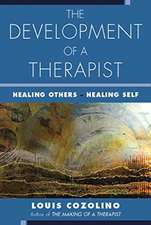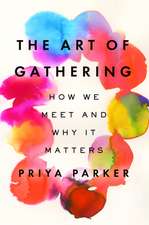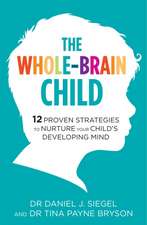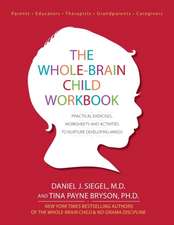Why Therapy Works – Using Our Minds to Change Our Brains: Norton Series on Interpersonal Neurobiology
Autor Louis Cozolinoen Limba Engleză Hardback – 11 ian 2016
In Why Therapy Works, Louis Cozolino explains the mechanisms of psychotherapeutic change from the bottom up, beginning with the brain, and how brains have evolved--especially how brains evolved to learn, unlearn, and relearn, which is at the basis of lasting psychological change.
Readers will learn why therapists have to look beyond just words, diagnoses, and presenting problems to the inner histories of their clients in order to discover paths to positive change. The book also shows how our brains have evolved into social organs and how our interpersonal lives are a source of both pain and power. Readers will explore with Cozolino how our brains are programmed to connect in intimate relationships and come to understand the debilitating effects of anxiety, stress, and trauma.
Finally, the book will lead to an understanding of the power of story and narratives for fostering self-regulation, neural integration, and positive change.
Always, the focus of the book is in understanding underlying therapeutic change, moving beyond the particular of specific forms of therapy to the commonalities of human evolution, biology, and experience.
This book is for anyone who has experienced the benefits of therapy and wondered how it worked. It is for anyone thinking about whether therapy is right for them, and it is for anyone who has looked within themselves and marveled at people's ability to experience profound transformation.
Din seria Norton Series on Interpersonal Neurobiology
-
 Preț: 345.00 lei
Preț: 345.00 lei -
 Preț: 283.05 lei
Preț: 283.05 lei - 5%
 Preț: 298.58 lei
Preț: 298.58 lei - 5%
 Preț: 283.49 lei
Preț: 283.49 lei - 5%
 Preț: 206.31 lei
Preț: 206.31 lei - 5%
 Preț: 372.04 lei
Preț: 372.04 lei - 5%
 Preț: 316.19 lei
Preț: 316.19 lei - 5%
 Preț: 298.49 lei
Preț: 298.49 lei - 5%
 Preț: 283.85 lei
Preț: 283.85 lei -
 Preț: 187.98 lei
Preț: 187.98 lei -
 Preț: 200.91 lei
Preț: 200.91 lei - 5%
 Preț: 176.45 lei
Preț: 176.45 lei -
 Preț: 188.19 lei
Preț: 188.19 lei - 5%
 Preț: 86.50 lei
Preț: 86.50 lei -
 Preț: 314.06 lei
Preț: 314.06 lei -
 Preț: 249.94 lei
Preț: 249.94 lei - 8%
 Preț: 465.41 lei
Preț: 465.41 lei - 5%
 Preț: 178.36 lei
Preț: 178.36 lei -
 Preț: 165.62 lei
Preț: 165.62 lei -
 Preț: 353.66 lei
Preț: 353.66 lei - 5%
 Preț: 222.92 lei
Preț: 222.92 lei - 5%
 Preț: 205.18 lei
Preț: 205.18 lei -
 Preț: 275.95 lei
Preț: 275.95 lei - 5%
 Preț: 412.74 lei
Preț: 412.74 lei -
 Preț: 186.98 lei
Preț: 186.98 lei -
 Preț: 230.10 lei
Preț: 230.10 lei -
 Preț: 176.86 lei
Preț: 176.86 lei - 5%
 Preț: 234.86 lei
Preț: 234.86 lei - 5%
 Preț: 154.93 lei
Preț: 154.93 lei - 5%
 Preț: 334.94 lei
Preț: 334.94 lei - 5%
 Preț: 71.95 lei
Preț: 71.95 lei - 5%
 Preț: 269.60 lei
Preț: 269.60 lei -
 Preț: 336.89 lei
Preț: 336.89 lei -
 Preț: 187.27 lei
Preț: 187.27 lei -
 Preț: 189.62 lei
Preț: 189.62 lei - 5%
 Preț: 330.27 lei
Preț: 330.27 lei - 5%
 Preț: 176.55 lei
Preț: 176.55 lei -
 Preț: 271.48 lei
Preț: 271.48 lei -
 Preț: 283.92 lei
Preț: 283.92 lei -
 Preț: 348.75 lei
Preț: 348.75 lei -
 Preț: 343.95 lei
Preț: 343.95 lei - 5%
 Preț: 219.50 lei
Preț: 219.50 lei - 5%
 Preț: 374.13 lei
Preț: 374.13 lei - 5%
 Preț: 207.22 lei
Preț: 207.22 lei -
 Preț: 358.55 lei
Preț: 358.55 lei -
 Preț: 176.14 lei
Preț: 176.14 lei -
 Preț: 232.34 lei
Preț: 232.34 lei - 5%
 Preț: 356.81 lei
Preț: 356.81 lei -
 Preț: 216.26 lei
Preț: 216.26 lei
Preț: 148.21 lei
Nou
28.36€ • 29.61$ • 23.47£
Carte disponibilă
Livrare economică 15-29 martie
Livrare express 01-07 martie pentru 28.48 lei
Specificații
ISBN-10: 0393709051
Pagini: 288
Dimensiuni: 149 x 218 x 32 mm
Greutate: 0.48 kg
Editura: W. W. Norton & Company
Seria Norton Series on Interpersonal Neurobiology
Descriere
In Why Therapy Works, Louis Cozolino explains the mechanisms of psychotherapeutic change from the bottom up, beginning with the brain, and how brains have evolved--especially how brains evolved to learn, unlearn, and relearn, which is at the basis of lasting psychological change.
Readers will learn why therapists have to look beyond just words, diagnoses, and presenting problems to the inner histories of their clients in order to discover paths to positive change. The book also shows how our brains have evolved into social organs and how our interpersonal lives are a source of both pain and power. Readers will explore with Cozolino how our brains are programmed to connect in intimate relationships and come to understand the debilitating effects of anxiety, stress, and trauma.
Finally, the book will lead to an understanding of the power of story and narratives for fostering self-regulation, neural integration, and positive change.
Always, the focus of the book is in understanding underlying therapeutic change, moving beyond the particular of specific forms of therapy to the commonalities of human evolution, biology, and experience.
This book is for anyone who has experienced the benefits of therapy and wondered how it worked. It is for anyone thinking about whether therapy is right for them, and it is for anyone who has looked within themselves and marveled at people's ability to experience profound transformation.
Notă biografică
Dr. Lou Cozolino practices psychotherapy and consulting psychology in Beverly Hills, California. He received his PhD in Clinical Psychology from UCLA and an MTS from Harvard University. He has been a professor at Pepperdine since 1986 and lectures around the world on psychotherapy, neuroscience, trauma, and attachment. Dr. Cozolino is the Series Editor of the Norton Series on Interpersonal Neurobiology (IPNB) and the author of ten Norton books, including the bestsellers The Neuroscience of Psychotherapy, 3rd Edition, The Neuroscience of Human Relationships, 2nd Edition, and The Making of a Therapist.



















